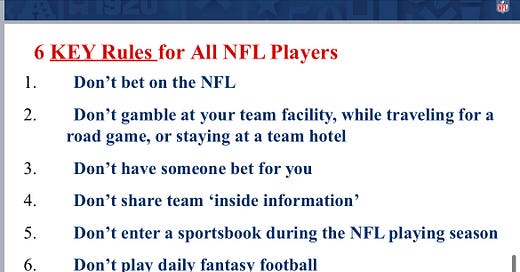I know expanded legal sports betting is still pretty new in the US. But it’s also now more than five years old, and betting on American sports didn’t start five years ago.
So it’s kind of mind-boggling that we are seeing penalties for athletes in some sports that are totally disconnected from reality.
There have been two examples come out recently of subideal enforcement against athletes who gamble. Let’s start with the NCAA, which is the crazier one.
The new rules start off fine. Bet on your sport? You may be banned from competition. No problem there:
Student-athletes who engage in activities to influence the outcomes of their own games or knowingly provide information to individuals involved in sports betting activities will potentially face permanent loss of collegiate eligibility in all sports. This would also apply to student-athletes who wager on their own games or on other sports at their own schools.
Where things go off the rails is with the rules for athletes who just bet on sports unrelated to theirs. More from the NCAA:
For all other wagering-related violations (e.g., wagering on professional sports), cumulative dollar value of the wagers will be taken into consideration with the following terms for reinstatement:
$200 or less: sports wagering rules and prevention education.
$201-$500: loss of 10% of a season of eligibility, plus rules and prevention education.
$501-$800: loss of 20% of a season of eligibility, plus rules and prevention education.
Greater than $800: loss of 30% of a season of eligibility, plus rules and prevention education.
Let me get this straight: Wagering an additional $600 is the difference between no suspension and a loss of a third of a season? This is bonkers, and has no grounding in sensible policy. I, for one, am shocked* the NCAA doesn’t understand this. (*I am not shocked.)
If you’re the NCAA and don’t want college athletes betting on sports because of the slippery slope, I can get behind that, even if I don’t agree with it. But parsing that hundreds of dollars of bets is somehow egregiously worse behavior is insane. The act of betting is what you are trying to stop, and creating bright lines of “x dollar amount is so much worse” is nonsensical. Please change this, NCAA.
Then we have the NFL, which similarly takes a hard line against players who bet on NFL games with indefinite suspensions that can be appealed. Again, no argument here; it should be common sense, and you probably deserve to lose your job if you bet on NFL games.
Where this breaks down, in my opinion, is at “don’t gamble at work.” This includes pretty innocuous things like betting at the team hotel or on a team plane, or just while traveling related to your team activities. I can get behind a ban on betting at the stadium and practice facilities, but in the parking lot? Who cares?
And yes, that’s pretty much something we all have to abide by in life: don’t gamble while you’re on the clock. But the problem is not really the rule, but the penalty and enforcement.
Detroit wide receivers Jameson Williams and Stanley Berryhill allegedly bet at a team facility on other sports, and were given suspensions of SIX GAMES. You could make a laundry list of things that are far worse transgressions committed by NFL players that have resulted in similar or even smaller penalties, including but not limited to instances of domestic violence.
I get the NFL is trying to protect “the shield” and avoid scandals related to gambling. I am just asking for some sanity in the meting out of punishment. A six-game suspension for betting on a sport that isn’t the NFL at a team facility is not an example of sanity.
Let’s hope other North American sports find some common sense in how they handle gambling.
The Closing Line is An +More Media publication.
For sponsorship inquiries email scott@andmore.media.






